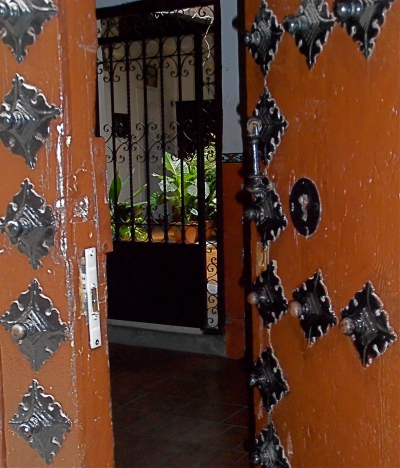A few weeks ago, I went to the doctor’s. It was a big event for me. I’d never been in need of medical attention before. Not in Spain, anyway. I’m of robust design, you see. I don’t pander to fancy foods that can’t be eaten with a spoon and I don’t get illnesses that can’t be cured by spending an afternoon in bed. However, a rebellious mole on my back was starting to morph into an octopus and it needed to be stopped by a professional.
Health centres are confusing places. I glanced around in a daze for ages until spotting a desk with a person who wasn’t either bellowing into a phone or being harangued by patient-staff scrum. I approached the woman stationed there and told her that I had an appointment at 11:30. Turns out that this was the desk where you make appointments and not the desk where you go when you already have an appointment. Once this was clarified, I asked her where I needed to go next. Up to the third floor, she said.
I followed her directions and arrived in a big central waiting room surrounded by four walls with lots of doors with names on them. Only then did it occur to me that I was missing a vital piece of information.
I returned to the desk lady for help. “Sorry,” I said, “I don’t actually know which doctor I’m supposed to be seeing. Could you tell me their name, please?”
And there it was.
The dreaded Crinkly Forehead.
I repeated my query, only to be met with yet more crinkles towering over a blank stare. I asked again. The crinkles assumed attack formation. I tried once more, in really simple Spanish, words spaced at one second intervals (I’ve had some practice at this, as you can tell). I repeated my question three more times. Still nothing. In an act of desperation, I grabbed a pen and paper from the desk and wrote it down. Finally, the name of my physician was divulged.
The most flabbergasting aspect of Crinkly Forehead is that it can spring into action BEFORE verbal communication even has a chance to commence. This happened to me in my local phone shop. As I handed my phone to the girl and drew breath to ask if she could please top it up with twenty bucks, I found myself confronted with a quizzically cocked head disfigured by crinkle over crinkle over fucking crinkle! They were humping each other, I swear! Then they called for re-inforcements and a bundle of veins as thick as anacondas after a meal of jungle elephants joined the wrestling match and… Christ, I did not know that the rosy baby bottom face of a twentynothing could even do that!
I’m guessing her inner thought process must have gone something like this: She looks like a foreigner, so whatever she is going to say will be incomprehensible. But I will try to help, because I’m a good person. But… what if she tries to make me speak in English?!?! Oh God, oh God, oh God, oh God! I’ve only studied it for ten years at school, I can’t say a word!!! What am I going to do, WHAT AM I GOING TO DO?!?! At this point, she reaches the conclusion that it’s safest just not to understand anything.
The Crinkly Forehead is the nemesis of every language learner, tourist, or foreigner in general. It is the iron curtain, the NATO missile defence shield and the wall Trump is gonna build all rolled into one.
Once the contortions commence, once you spot the merest ripple, the slightest tell-tale twitch in the face that may have been smiling benevolently at you just a heartbeat ago, dear language learner, you are doomed. It is the manifestation of Blue Screen of Death in a real live person. A re-boot can only be effected once the obstruction has been removed, and the obstruction, my hapless foreign friend, is YOU.
Attempting to engage with Crinkly Forehead is not like flogging a dead horse. It’s like flogging all the sausages, lasagnes, burgers and chicken nuggets that its macerated remains found their way into, expecting the clapped-out old mare to re-assemble and run the Grand National. It ain’t gonna happen. No chance. Go home. Talk to Siri.
I, my dear people, will be talking to my mole. At least it is forthcoming, if only with tentacles.
I think we all need a restorative wedge of cake after this.

Keen observers will have noticed that this very same specimen featured in the previous post, but from a different angle. C’mon… it still looks delicious, does it not?! If it fails to appeal, maybe hairy chested man in the back will do it for you…?
[Note for nerds: This post was also published on my new language blog http://multilingualbychoice.blogspot.com – please pop over for a visit to discover what you’ve been missing!]


























